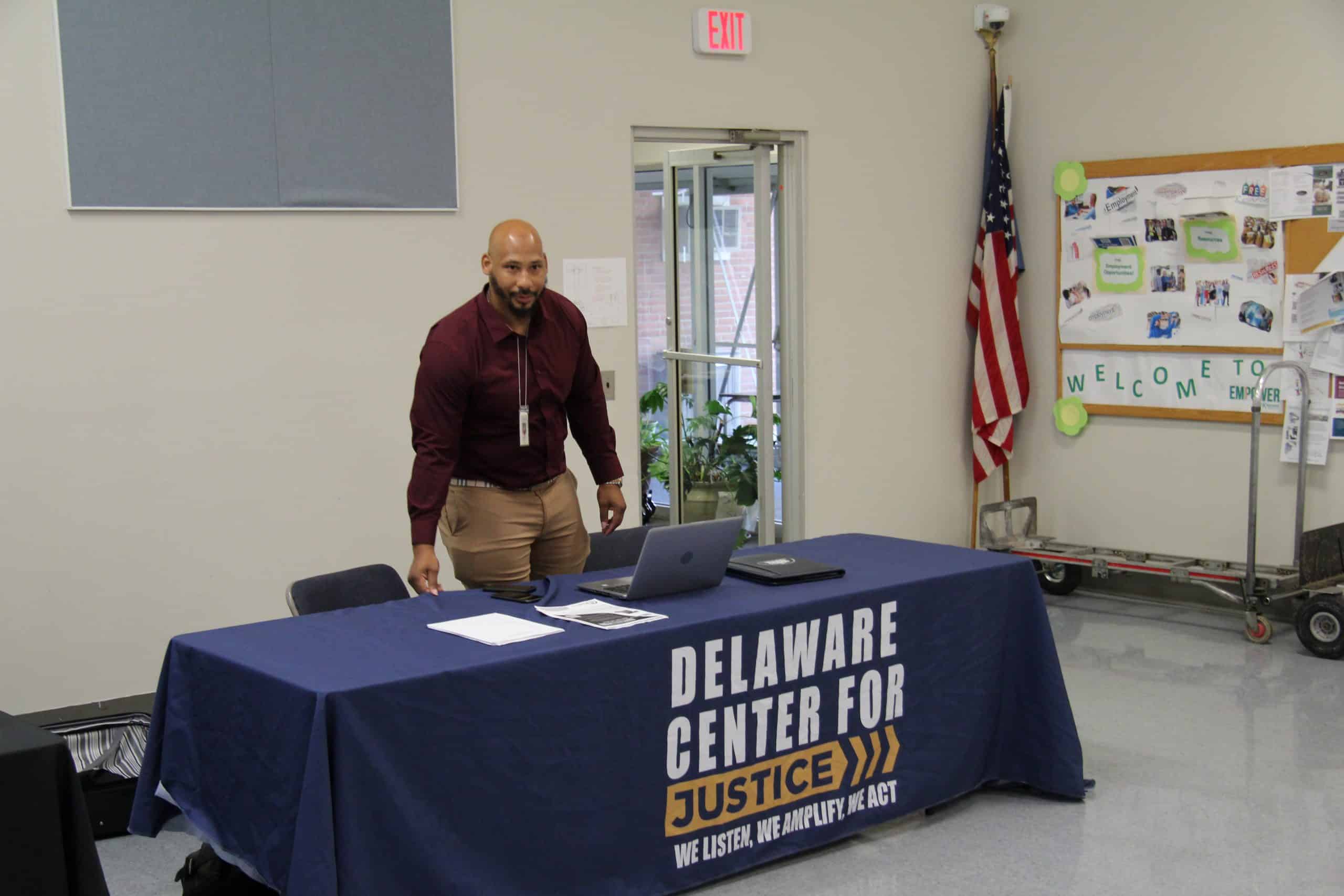
Our Work
The Delaware Center for Justice has succeeded in advocating for significant legislative reform since our inception. These reforms have improved the lives of many justice-involved individuals and we are committed to continuing to transform the system by listening, amplifying, and acting.

Current Partnerships
Of the approximately 4,000 people released from prison each year in Delaware, one in five will return to serve a subsequent prison sentence within three years. Two factors that support successful reentry are stable housing and employment.

In 2020, the DCJ partnered with the DE Department of Housing and the Department of Correction on a pilot project that permits returning citizens to live with supportive family members in public housing.

We also work with 2 Fish Home Renovations to connect formerly incarcerated persons with initial employment and job development opportunities in the construction trade. We’re thrilled to announce that we’ve just been chosen as the site for a new Transitional Reentry program to support reentering Delawareans in the crucial first weeks after release.

Legislative Tracker
Nonconvictions Bill
TBD
Problem:
Nearly 9 out of 10 employers conduct a background check before making a hiring decision. These background checks include non-conviction records. Under current law, people serving terms of incarceration, probation, or parole are ineligible to apply for an expungement. This provision prevents people who are incarcerated, and on probation or parole, from expunging cases that have been terminated in their favor. These are cases where they were legally found innocent and if they were not serving terms of incarceration, probation, or parole, the case would be eligible for mandatory expungement.
Status:
Bill No.: TBD (official draft expected by Feb/March)
Key Community Partners:
ACLU-DE/Clean Slate DE/DOC
House Bill
Bill: House Bill 1
Summary:
This Act removes all penalties for use or possession of a personal use quantity of marijuana and marijuana accessories. It further specifies that the adult sharing of a personal use quantity or less of marijuana is legal activity for those 21 years of age or older and that those 21 or older may possess, use, display, purchase, or transport accessories and personal use quantities of marijuana without penalty. When transporting in a vehicle, those items must be in a closed container or otherwise not readily accessible to anyone inside the vehicle. The statute also specifies certain activities which remain unlawful. Finally, the definition of “personal use quantity” of marijuana is updated to include not only 1 ounce or less of leaf marijuana, but also equivalent amounts of marijuana product in other forms.Full Text of Bill
Notable News & Research:
“The Steep Costs of Criminal Justice Fees and Fines”
Status:
Senate Judicial Committee 5/31/19.
What happens next?
Awaiting consideration in Committee.
An act to amend titles 10 and 11 of the Delaware code relating to expungement.
Bill: HB 447
Summary:
This Act revises Delaware’s death penalty statute to ensure its compliance with the United States Constitution, as interpreted by the United State Supreme Court in Hurst v. Florida, and by the Delaware Supreme Court in Rauf v. State. Full Text of Bill
Notable News, Research & Resources:
“The State of Capital Punishment”
Status:
Introduced and Assigned to Judiciary Committee in House 3/12/20.
What Happens Next?
Awaiting Consideration in Committee.
According to the Death Penalty Information Center, 167 people have been exonerated from death row since 1973. This is only one disturbing statistic out of many when it comes to the death penalty. The Delaware Center for Justice strongly opposes the death penalty, and encourage you to contact your legislators and let them know how you feel about the death penalty.
Past Legislative Success
Restoring TANF Access
Bill: HB 11
Summary:
This Act removes the prohibition against receipt of Temporary Assistance for Needy Families (“TANF” also referred to by the name Aid for Families with Dependent Children or “AFDC”) funds by persons convicted of a drug felony, so long as that person is otherwise eligible or TANF assistance. Even though federal laws such as PRWORA passed during the War on Drugs frequently prohibited access to public assistance for persons with drug felonies, these laws also gave states flexibility in determining eligibility for food aid and cash assistance for families with children when applicants had a criminal conviction. The majority of states have limited the federal bans in whole or in part. In 2011, Delaware opted out of restrictions on food aid, but it has not opted out of or limited federal restrictions on TANF—the cash assistance program that is the principal form of assistance available to most families in poverty to pay for things like electricity bills or school supplies. Under existing law, individuals convicted of any state or federal drug felony, including possession of marijuana (which can be a felony under federal law), are ineligible for TANF for life. Although the children of a parent convicted of a drug crime can still receive assistance, the family’s overall award is significantly reduced, and in practice this affects the well-being of families and children. Full text can be found here.
Notable News & Research:
A Lifetime of Punishment: The Impact of the Felony Drug Ban on Welfare Benefits – The Sentencing Project, 2015
Status: On 5/2/17, HB 11 passed the Senate.
What happens next?: HB 11 has gone to Governor Carney’s desk.
DCJ believes that families should be able to move forward, past a parent or sibling’s previous indiscretions. We fully support the legislative effort to remove this restriction.
Extreme Crimes Prevention Act
Bill: HB 125 (Extreme Crimes Prevention Act)
Summary:
This bill would restore a prosecutor’s ability to seek the death penalty in Delaware by requiring a jury to unanimously “and beyond a reasonable doubt” find one or more aggravating circumstances that make the offense eligible for capital punishment.
Full Text can be found here
Notable News, Research & Resources:
Delaware Citizens Opposed to the Death Penalty
Delaware Repeal
Status: HB 125 has made it out of the House Judiciary Committee.
What happens next?
Awaiting consideration in Committee.
The Delaware Center for Justice is a staunch advocate against the death penalty. Specifically, we believe it is racially biased and arbitrarily applied. Our current system of justice is imperfect, which puts innocent lives at risk. The death penalty is also extremely costly to the taxpayers. Simply put, the death penalty is the wrong public policy choice for Delaware.
Pretrial Modernization
Bill: HB204
Summary:
This bill seeks to protect both public safety and defendants’ rights by seeking to improve pretrial decisions and outcomes while avoiding the unnecessary detention of people who do not pose a risk to public safety. The bill empowers those tasked with supervising individuals with the tools they need to monitor them properly while released- tools currently lacking under our existing system. Full text can be found here.
Notable News, Research & Resources:
“Fear mongering should not prevent pretrial reform in Delaware”
UUDAN presentation
Status:
Signed on 1/25/18
What Happens Next?
Becomes effective upon date of signature of the Governor or upon date specified.
The Delaware Center for Justice supports the implementation of a validated risk assessment tool to assess the risk a defendant poses to the community. Additionally, DCJ supports the elimination of cash bail in favor of a risk-based bail system, which requires an expansion of Delaware’s pretrial supervision capacity.
Expanding Access to Juvenile Expungements
Bill: SB 54
Summary:
Senate Bill 54 will help individuals (kids and adults) with juvenile records that have matured and moved beyond any youthful indiscretions. This bill will give them the chance to petition the Court to review the facts of the case, their individual circumstances, as well as any opposing arguments from prosecutors and/or victims, and decide whether or not their record causes a manifest injustice and should be expunged. Senate Bill 54 accomplishes this by:
1) Eliminating the prohibition against even being able to petition Family Court for a discretionary expungement for certain adjudications (Robbery 1st, Burglary 1st, or Home Invasion).
2) Streamlining and expanding the net of people with juvenile records who can petition the court for a discretionary expungement.
Full Text can be found here.
Status: Signed on 6/20/17.
What Happens Next?
Becomes effective upon date of signature of the Governor or upon date specified.
research, policy, and action
Pretrial Reform
The Delaware Center for Justice believes that liberty should be the norm and that all individuals are innocent until proven guilty.
Sentencing Reform
The Delaware Center for Justice supports policies and practices that safely, thoughtfully, and effectively reduce our reliance on incarceration.
Youth/Juvenile Justice
The Delaware Center for Justice supports policies and practices that are fair, equitable and developmentally appropriate for youth involved in or at risk of becoming involved in the justice system.
Victims’ Rights & Restorative Justice
The Delaware Center for Justice supports policies and practices that strengthen victims and rebuild communities. DCJ believes in the power of restorative justice practices and that the victims’ voices must be a key part of the legal system process.
Collateral Consequences
The Delaware Center for Justice supports comprehensive policy reform that provides true second chances for individuals who have paid their debt to society.
resources
Unfortunately, we cannot accept walk-in clients, but please browse through the wealth of resources on our website. Call us at 302 – 658 – 7174 if you would like to be referred to one of our programs.

Resources
Unfortunately, we cannot accept walk-in clients, but please browse through the wealth of resources on our website. Call us at 302-658-7174 if you would like to be referred to one of our programs.




